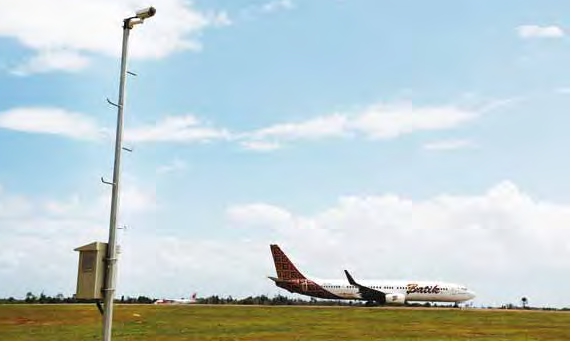HANG NADIM INTERNATIONAL AIRPORT RELIES ON FLIR FOR FAIL-PROOF PERIMETER PROTECTION
Hang Nadim International Airport (Indonesia) has demonstrated considerable growth ambitions in recent years, as the airport is becoming a major hub for both domestic and international connections. But the airport’s growth also coincides with increased safety requirements, and a continuous effort to prevent accidents, fatalities, injuries or significant damage. To be ready for future growth and to offer its passengers more security, Hang Nadim International Airport recently invested in advanced thermal video security technology from FLIR Systems.
Hang Nadim International Airport is located in Batam, Riau Islands, Indonesia. Batam, an Indonesian island located close to Singapore, has quietly emerged as a domestic hub with a large volume of transit passengers. Mostly serving domestic flights, all the major domestic carriers operate out of Batam with services to Jakarta, Surabaya, Bandung, Medan and Padang. Originally developed as an alternative airport for Singapore Changi Airport, Hang Nadim Airport has facilities and the longest runway (4,000 m) in Indonesia, sufficient for wide body aircraft Boeing 747s and several times more passengers than it is currently serving.
SECURING THE AIRPORT PERIMETER
Security is a serious issue for airport authorities. The threat of terrorist attacks at airports is never far away. And although passenger screening inside airports has received its due attention worldwide, the airport perimeter often remains a weak spot at many airports, giving intruders much too easy access to airplane runways and taxiways. This has not escaped the attention of Hang Nadim International Airport officials. Until recently, the airport’s 16 kilometer perimeter was only secured by a fence, in combination with CCTV cameras and frequent patrols of security personnel. This approach was insufficiently covering the airport’s security issue, in at least two ways.
First of all, it’s very difficult for security patrols to be everywhere all the time, certainly with the size of the perimeter in mind, so 100% coverage is not possible this way. Second, CCTV cameras cannot see during the night without lighting, which would be very costly to install along a 16 km perimeter. Once inside the perimeter area, it would be almost impossible to install lighting poles across the airfield to support CCTV cameras, because they could possibly obstruct the movements of the aircraft on the runways and taxiways.
THERMAL SECURITY CAMERAS
After thorough research, the airport authorities decided to use thermal imaging cameras from FLIR Systems to monitor the entire perimeter. FLIR thermal security cameras can see as well at night as they can during the day. And unlike conventional CCTV cameras, they are not dependent on visible light or supplementary illumination from lights or lasers. 27 FLIR FC-Series cameras with 19 mm and 35 mm lens are now used to monitor the perimeter. In addition, Batam airport installed two FLIR PT-602CZ long-range multi-sensor thermal & visible pan/tilt cameras and two FLIR Ranger® R2 high-resolution radar units to have a complete overview of the airport’s aprons, taxiways, and four-kilometer long runway. The PTZ camera and radar complement each other really well and make it virtually impossible for anyone to enter the airfield unnoticed. The Ranger R2 radar accurately detects people and vehicles up to a 1,400 meter range. And, it operates in virtually any climate, weather or lighting condition to provide 24/7 security, scanning 360° every second. Whenever a target is picked up by the radar, an alarm is sent to the FLIR Sensor Manager video management system. This will in turn activate the automatic slew-to-cue mechanism of the FLIR PT-602CZ pan/ tilt camera. This means that the pantilt camera is automatically steered to the exact latitude, longitude and elevation of an alarm, provided by the radar, so that the security personnel in the airport control room can instantly see what’s going on on the visible and thermal camera image. In addition, all thermal video footage is recorded in real time by the FLIR DNR500 network video recorder.
COMPLETE OVERVIEW OF THE SITE
According to the airport’s Chief of Aviation Technics, the FLIR security monitoring system is performing extremely well 24/7 and the authorities have already been able to detect intruders shortly after the installation of the thermal cameras. The fact that the airport does not need to install any lighting to secure the entire area and perimeter has proven to be a great cost-saver. In addition to this, the detection range of the radar and pan/ tilt systems are so wide that only two units are needed to cover the entire area. The airport officials also value the video analytics on the FLIR FC-Series cameras as they provide optimal intrusion detection in challenging imaging environments. This allows the airport control room staff to take immediate measures whenever that is needed.



